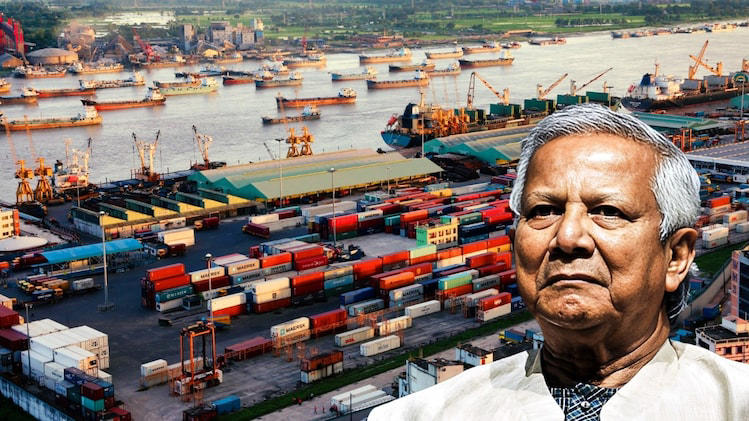India Ends Bangladesh’s Transshipment Access After Yunus’ Landlocked Comment on Northeast States
In a significant diplomatic development, India has officially withdrawn the transshipment facility it had extended to Bangladesh, marking a sharp escalation in bilateral tensions following recent controversial remarks by Bangladesh’s interim leader Muhammad Yunus. This facility, which allowed Bangladesh to use Indian ports and airports—including those in Delhi—for exporting goods to the Middle East, Europe, and other global markets, was abruptly terminated effective April 8, according to an announcement by the Indian Ministry of External Affairs.
The move comes just days after Yunus, during a business event in China, described India’s seven northeastern states as “landlocked” and claimed that they have “no way to reach the ocean except through Bangladesh.” These comments were perceived in New Delhi as undermining India’s sovereignty and regional connectivity ambitions, especially at a time when the northeastern region has seen significant infrastructural and strategic development under Prime Minister Narendra Modi’s leadership.
External Affairs Ministry spokesperson Randhir Jaiswal explained that logistical challenges played a role in the decision. He noted that the transshipment arrangement had led to substantial congestion at Indian airports and ports, resulting in logistical delays, higher costs, and backlogs that adversely affected India’s own export mechanisms. “The trans-shipment facility extended to Bangladesh had over a period of time resulted in significant congestion at our airports and ports,” said Jaiswal. He emphasized that this measure, although immediate, was grounded in national interest and economic efficiency.
The reaction from political leadership in India has been equally assertive. Assam Chief Minister Himanta Biswa Sarma highlighted that this action reflects Prime Minister Modi’s unwavering commitment to securing the strategic and economic priorities of India, particularly the Northeast. Sarma described the revocation as a “decisive action” taken to protect national interests, asserting that the government’s stance sends a strong message about the importance of respect and cooperation in regional diplomacy.
Initiated during the COVID-19 pandemic in 2020 and formalized in 2022, the transshipment facility had been a symbol of growing trade ties between the two neighbors. However, India has clarified that the new restrictions do not apply to Bangladesh’s exports to Nepal and Bhutan that transit through Indian territory, as such access is protected under World Trade Organization (WTO) norms for landlocked countries.
The diplomatic row intensified further following a meeting between Muhammad Yunus and Prime Minister Narendra Modi on April 4, held on the sidelines of the BIMSTEC summit in Bangkok. Controversy erupted over Dhaka’s public representation of the meeting. A Facebook post by Yunus’ press secretary Shafiqul Alam claimed that Yunus had raised the issue of extraditing former Prime Minister Sheikh Hasina, who has been residing in New Delhi since fleeing Dhaka in August last year, and suggested that India’s response was “not negative.” Indian officials quickly denounced this portrayal as “mischievous and politically motivated,” stressing that the depiction distorted the tone and content of the bilateral engagement.
In India’s official readout of the Bangkok meeting, Prime Minister Modi expressed “deep concerns” about the safety and treatment of Hindus and other minorities in Bangladesh. He also warned against rhetoric that could deteriorate the diplomatic atmosphere, signaling India’s growing unease over the political direction of its eastern neighbor’s interim leadership.
The extradition request for Sheikh Hasina, filed by Bangladesh’s interim administration in 2024, remains unanswered by India. The matter, coupled with increasing reports of attacks on minority communities in Bangladesh, has further strained what was once a close partnership built on historical ties and shared security interests.
The abrupt cancellation of the transshipment facility and the mounting political tensions underscore a dramatic shift in India-Bangladesh relations. With both nations now recalibrating their diplomatic strategies, the region is likely to see further geopolitical maneuvering in the days ahead.
For video news and more in-depth coverage, visit our YouTube channel THE OLIGO.

